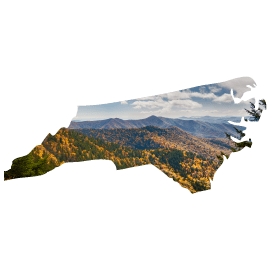Teacher Preparation Program Accountability :
North Carolina
Delivering Well Prepared Teachers Policy
Analysis of North Carolina's policies
North Carolina's approval process for its traditional and alternate route teacher preparation programs does not hold programs accountable for the quality of the teachers they produce.
Most importantly, North Carolina does not collect value-added data that connect student achievement gains to teacher preparation programs.
The state does rely on some objective, meaningful data to measure the performance of its traditional teacher preparation programs. For program approval, it requires evidence that during the two preceding consecutive years, 95 percent of graduates employed by public schools have earned a continuing license. North Carolina also collects programs' annual summary licensure test pass rates (70 percent of program completers must pass their licensure exams). However, the 70 percent pass-rate standard sets the bar quite low and is not a meaningful measure of program performance.
However, the state does not collect these data for its alternate route. Further, there is no evidence that the state's standards for program approval are resulting in greater accountability. In the past three years, no programs in the state have been identified in required federal reporting as low performing.
Finally, North Carolina's website does include a report card that allows the public to review and compare traditional teacher preparation program performance.
According to the state's winning Race to the Top application, North Carolina links teachers' effect on student achievement and growth data to preparation programs within the UNC system, and uses data to evaluate the effectiveness of programs. The state plans to expand this policy to independent programs.
Recommendations for North Carolina
Collect data that connect student achievement gains to teacher preparation programs.
To ensure that programs are producing effective classroom teachers, North Carolina should consider academic achievement gains of students taught by the programs' graduates, averaged over the first three years of teaching. Although the state, as outlined in its RttT application, has such a policy in place within its UNC system, it is urged to codify these requirements to ensure that all programs are held accountable for teacher quality and specify that they apply to alternate route programs as well as to traditional teacher preparation programs.
Gather other meaningful data that reflect program performance.
In addition to knowing whether programs are producing effective teachers, other objective, meaningful data can also indicate whether programs are appropriately screening applicants and if they are delivering essential academic and professional knowledge. Building on the data the state currently collects for its traditional teacher preparation programs, North Carolina should gather data for all teacher preparation programs, such as the following: average raw scores of graduates on licensing tests, including basic skills, subject matter and professional knowledge tests; satisfaction ratings by school principals and teacher supervisors of programs' student teachers, using a standardized form to permit program comparison; evaluation results from the first and/or second year of teaching; and five-year retention rates of graduates in the teaching profession.
Establish the minimum standard of performance for each category of data.
Programs should be held accountable for meeting these standards, with articulated consequences for failing to do so, including loss of program approval after appropriate due process.
State response to our analysis
North Carolina recognized the factual accuracy of this analysis. The state added that over the last three years, it has completed a re-visioning process for teacher preparation programs. In the summer of 2012, North Carolina will pilot the review of candidate evidences to assess program quality. This process will eventually shift the program approval process from one that assesses inputs to one that assesses outputs. Also, the state is in the process of creating institution report cards as outlined in its Race to the Top proposal.
Last word
NCTQ looks forward to reviewing the state's progress in future editions of the Yearbook.
Select another topic
Delivering Well Prepared Teachers
- Admission into Preparation Programs
- Elementary Teacher Preparation
- Elementary Teacher Preparation in Reading Instruction
- Elementary Teacher Preparation in Mathematics
- Middle School Teacher Preparation
- Secondary Teacher Preparation
- Secondary Teacher Preparation in Science
- Secondary Teacher Preparation in Social Studies
- Special Education Teacher Preparation
- Assessing Professional Knowledge
- Student Teaching
- Teacher Preparation Program Accountability
Expanding the Pool of Teachers
Identifying Effective Teachers
- State Data Systems
- Evaluation of Effectiveness
- Frequency of Evaluations
- Tenure
- Licensure Advancement
- Equitable Distribution
Retaining Effective Teachers
Exiting Ineffective Teachers
Research rationale
See NCTQ, Alternative Certification Isn't Alternative (2007) regarding the dearth of accountability data states require of alternate route programs.

